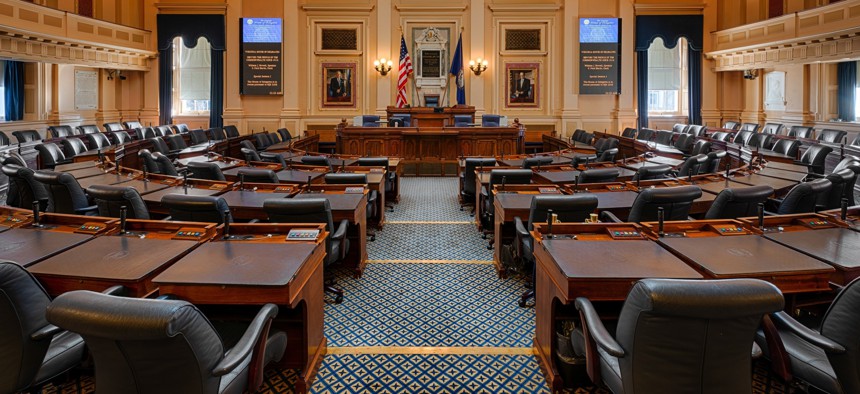Volcker Alliance Aims to ‘Expose the Game’ Some States Play With Their Budgets

The Virginia House of Delegates chamber. Nagel Photography / Shutterstock.com

Connecting state and local government leaders
A new report criticizes questionable fiscal tactics and calls for more transparency in spending decisionmaking processes.
State governments should make budgeting processes more transparent and avoid one-time “sleight of hand” maneuvers to align spending with revenue, the nonpartisan Volcker Alliance argues in a new report that was released on Monday.
Shifting receipts and expenditures across fiscal years, issuing long term debt to pay near term costs, and short-changing pension funds, are among the questionable fiscal tactics called out in the report. The authors contend that these and other practices drive ill-informed policymaking, saddle future generations with unjustified debt and restrict states’ spending options.
“It is impossible for the public to make honest, fair political judgements in terms of who they elect and how they balance the public needs versus the level of taxation, if they are being fooled by dishonest budgeting,” said Richard Ravitch, a Volcker Alliance board member.
Ravitch assisted in resolving a fiscal crisis in New York City during the 1970s, and more recently served as lieutenant governor of New York state. He spoke at a press conference in Manhattan on Monday, along with others who are involved with the Alliance’s work, including former Federal Reserve Chairman Paul A. Volcker, who launched the organization.
One of the key recommendations the report's authors make is that states should provide clear, readily available, documentation about how they went about balancing their budgets. There are large amounts of government financial information currently available online. But the report says this information “can be difficult to find and interpret,” and that deciphering what it means can require documents from multiple sources and, potentially, input from experts.
The report looks specifically at three states, which are each in somewhat different financial circumstances: California, Virginia and New Jersey.
California, the report says, has reformed its budgeting practices in recent years but, as of 2013, was still on the hook for nearly $200 billion in unfunded pension and retiree healthcare liabilities. Virginia is recognized for its “history of more-careful budget management,” but the report also notes that the state has faced challenges with underperforming revenues. New Jersey has seen better days. The state is confronting yawning pension shortfalls, has relied on overly-optimistic revenue forecasts, and also has the largest per-capita property tax collections and the second highest overall tax burden in the U.S., which limits possibilities for increasing revenue.
In response to a question about tax policy at the press conference on Monday, John Nixon, a former budget director for both the states of Utah and Michigan, pointed to the heavy weight that pensions and other post employment benefits, also called “OPEB” costs, were placing on many states. The bulk of OPEB expenses are typically made up of payments for retiree healthcare.
“Right now these OPEB and pension costs are strangling budgets,” Nixon said. “I mean in Michigan, we’re financing two workforces in our education system. We’re financing the current teachers and we’re also financing all of the retirement benefits for the previous teachers.”
“We can’t kick the can to future generations,” he added.
Although 49 states have constitutional, or statutory requirements calling for balanced budgets, what “balanced” means is open to interpretation. Volcker highlighted this point in his remarks on Monday.
“How can you borrow to meet a balanced budget requirement?” Volcker asked. “Don’t count on the balanced budget requirement,” he added, saying that it gives rise to “game playing.” But, in his view, that’s where the Alliance’s work can help. He said: “We’re trying to expose the game.”
(Photo by Nagel Photography / Shutterstock.com)

NEXT STORY: Proposed Calif. Ballot Initiative Would Put Voters in Control of Future Pensions





